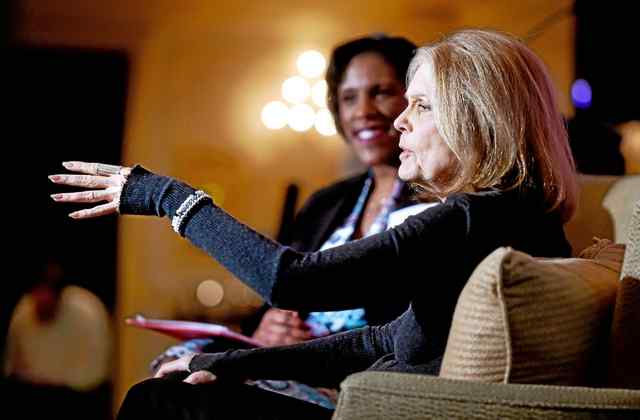By Ed Stannard
New Haven Register, Conn.
NEW HAVEN
While she believes Hillary Clinton can be elected president, Gloria Steinem thinks the biggest fight for equality for women is at the state and local levels.
Steinem, longtime activist for gender equality and founder of Ms. Magazine in 1971, spoke Friday at the 20th anniversary celebration of the Community Fund for Women and Girls, in a conversation with Teresa Younger, president of the Ms. Foundation for Women.
“The very right-wing forces have kind of lost in Washington,” Steinem said, referring to conservatives’ failure to amend the Constitution to protect unborn children. “But now those same forces are in a wide variety of state legislatures, striving to close down clinics. … The whole idea of controlling reproduction and therefore controlling women is deep.
“In the country at large, most people don’t know who their state legislators are. They operate in a penalty-free environment,” Steinem added, giving as an example how money is taken from education and spent on building prisons.
Younger pointed out that when she was executive director of Connecticut’s Permanent Commission on the Status of Women, the agency’s budget “was annihilated,” with a 65 percent budget cut.
Steinem noted the importance of the Community Fund for Women and Girls, which is part of the Community Foundation for Greater New Haven, because “trees grow from the bottom to the top.” The fund has given about $1 million in 20 years to 200 programs, including grants this year of $203,740 to eight organizations in Greater New Haven and the lower Naugatuck Valley.
They include a $160,000 signature grant to All Our Kin to help women in child care develop business and entrepreneurial skills.
As an example of how help at the grass roots is worthwhile, Steinem told a story of going to Zambia and finding out that girls were going into sex trafficking in the capital of Lusaka because the local crop of maize was being eaten by elephants and therefore not economically supporting the community. The Ms. Foundation provided an electrified fence and the next year, Steinem said, “They had a bumper crop of maize; they were singing songs to the maize … and they had food security.
“If you had asked me what would help prevent sex trafficking, I would not have said an electrified fence!” she said.
Asked about the genesis of the Ms. Foundation, Steinem said, “First we had the illusion — delusion — that small magazines made money, so we thought that we would put all the money that Ms. Magazine was going to make back into the women’s movement.”
But they found out that most foundations didn’t have a category for women and girls. “The women who were working there, who were very few, would say … How do I get my salary equalized? There are no women on our board.” That demonstrated the uphill climb the Ms. Foundation faced.
When Younger asked Steinem about the presidential race, Steinem said, “Since Hillary Clinton clearly is the most likely and most popular candidate right now, the question is, can she be elected? I would have answered no in 2008.
“We associate feminine authority with emotionality … but I think there’s a chance that she can be elected because we’ve seen enough women in public life.”














































































































































































































































































































































































